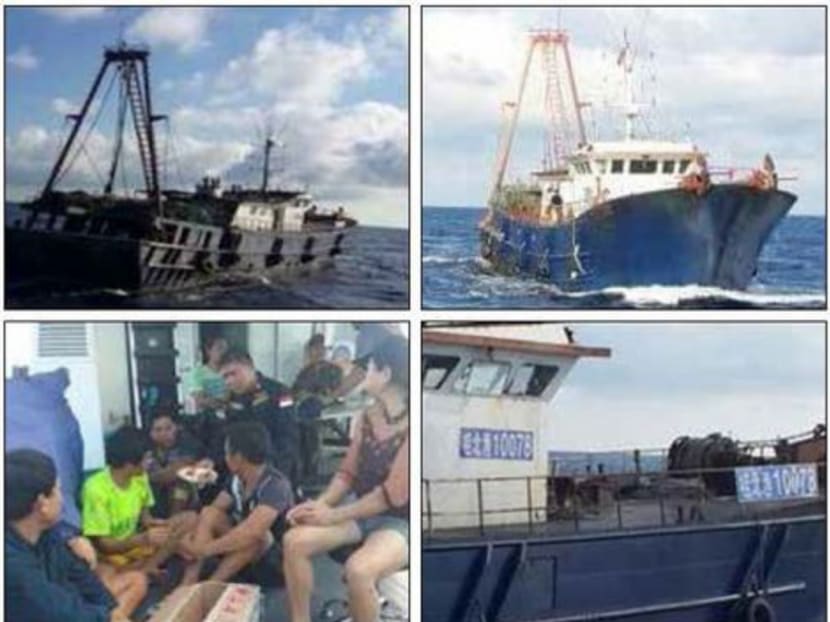Rows over fishing boats raise wider questions about China's intent
SINGAPORE — The United States finds it disturbing that maritime disputes between China and South-east Asian countries have escalated over Chinese fishing vessels accused of straying into the waters of countries in South-east Asia, said a senior US official yesterday.

Indonesia seized a Chinese fishing boat and arrested her eight crew (bottom left) for fishing within Indonesia's exclusive economic zone on March 19. China claims most of the South China Sea, which has led to disputes with a number of South-east Asian countries. Photos: Indonesian Ministry of Fishery and Marine Affairs
SINGAPORE — The United States finds it disturbing that maritime disputes between China and South-east Asian countries have escalated over Chinese fishing vessels accused of straying into the waters of countries in South-east Asia, said a senior US official yesterday.
“It is particularly disturbing to see fishing issues come to the fore,” said Ms Colin Willett, a Deputy Assistant Secretary in the US Department of State’s East Asia and Pacific Bureau.
“I think it’s a piece of broader pattern of behaviour where the scope and scale of China’s activities outpaces what we see in the rest of the region,” she told a group of South-east Asian journalists in a teleconference call from Washington DC.
“The fact that China is doing things on a broader scope and bigger scale raises the question about what the intent is over the long term and it is disturbing to see these things fraying to even greater tension in the region.”
Two weeks ago, China’s Coast Guard rammed one of the country’s fishing boats to pry it free from the Indonesian authorities who had seized it, angering the Indonesian government. The boat was stopped for fishing illegally in Indonesia’s waters and was being towed to port when the Chinese took it back, leaving its eight crew members in the hands of Indonesia.
Indonesian authorities said they caught the Chinese fishing boat within Indonesia’s maritime 200-mile exclusive economic zone, off the Natuna Islands northwest of Borneo.
Indonesia’s Maritime and Fisheries Minister, Susi Pudjiastuti, labelled the Chinese Coast Guard’s intervention “arrogant” and Ms Retno Marsudi, the Indonesian Foreign Minister, summoned Chinese Embassy officials in Jakarta and handed over an official letter of protest about the confrontation.
In response, Beijing said the fishing boat was operating in “traditional Chinese fishing grounds”, and that the Chinese Coast Guard vessel did not enter Indonesian waters.
China claims most of the South China Sea, through which about US$5 trillion (S$6.9 trillion) in ship-borne trade passes every year, by the “nine-dash line” it has marked on maps to define historical borders on which it claims sovereignty.
Indonesia is not embroiled in rival claims with China over the waterway, but has raised concerns over China’s inclusion of the resource-rich Natuna Islands in the nine-dash line.
Last week, Malaysian news agency Bernama reported that about 100 Chinese-registered boats have been detected encroaching on Malaysia’s waters in the South China Sea.
Malaysia’s National Security Minister Shahidan Kassim told reporters a Bombardier aircraft and three vessels from the Royal Malaysian Navy and the Malaysian Maritime Enforcement Agency had been deployed to check on the “encroachment” near the Luconia Shoals, off the Sarawak coast of Borneo.
But early this week, Malaysia’s Navy said no Chinese vessels had encroached into Malaysian waters, after an investigation.
Defence Minister Hishammuddin Hussein said the navy chief had told him that there was no trespass by Chinese vessels. “I am relieved that he (the navy chief) confirmed that our waters are safe,” he told reporters.






